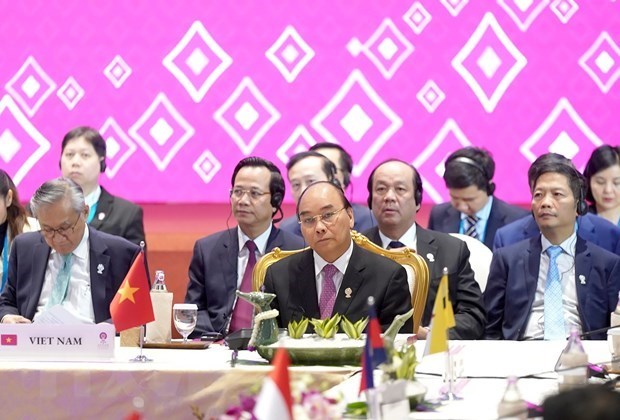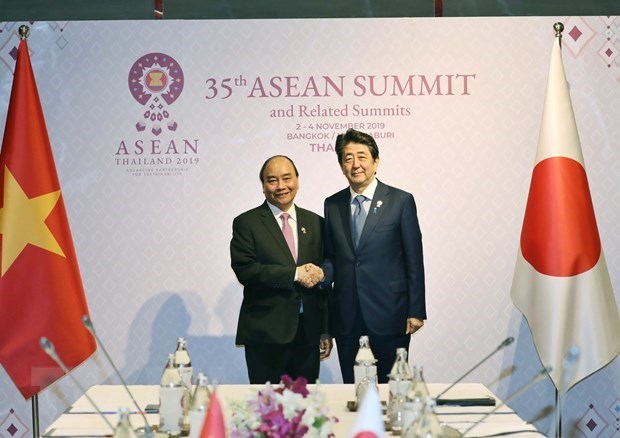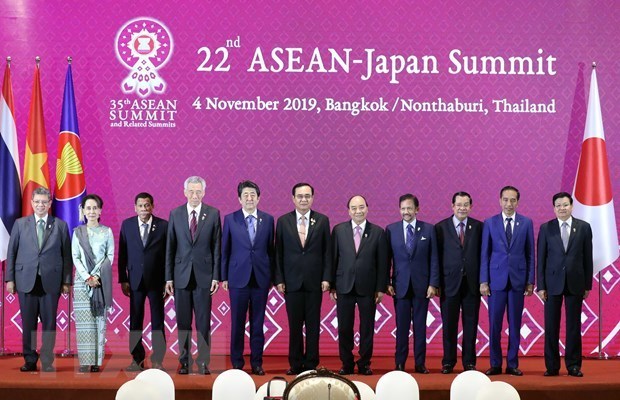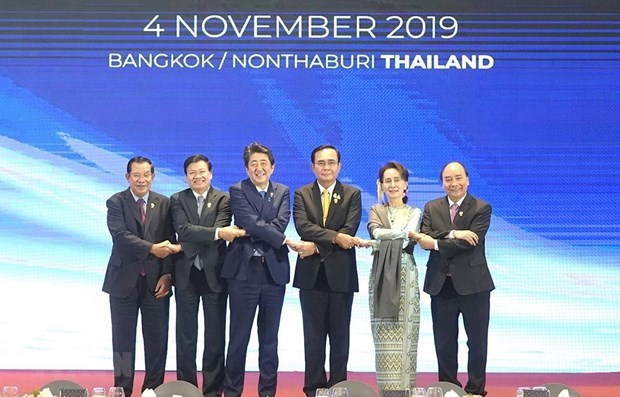 |
|
Prime Minister Nguyen Xuan Phuc (centre) at the 3rd Regional Comprehensive Economic Partnership (RCEP) Summit
|
At the RCEP Summit, participating leaders issued a joint statement concluding that the countries involved have completed text-based negotiations for all 20 chapters of the RCEP and essentially all their market access issues.
India has some unsolved problems, so RCEP participating counties will work together to resolve these outstanding issues in a mutually satisfactory way. The pact will be scrutinized in preparation for its signing in 2020.
The RCEP is a multilateral trade agreement between the 10 member states of ASEAN - Malaysia, Brunei, Cambodia, Indonesia, Laos, Myanmar, the Philippines, Singapore, Thailand and Vietnam - and its six Free Trade Agreement partners, namely China, Japan, the Republic of Korea, Australia, New Zealand and India.
Once formed, the RCEP will have a combined population of 3.56 billion people and a trade value of over 1 trillion USD, or 29 percent of the global total.
During a meeting with his Japanese counterpart, PM Phuc stated Vietnam considers Japan a trustworthy and long-standing partner with which it shares several mutual strategic benefits.
 |
|
PM Nguyen Xuan Phuc and his Japanese counterpart Abe Shinzo
|
Vietnam supports Japan in promoting its role regionally and globally, he said.
Abe took the occasion to thank Vietnam for its assistance to Japan as the coordinator of ASEAN-Japan relations.
Japan is looking forward to Vietnam assuming its ASEAN chairmanship next year, the leader added, stating that the two countries will work together to tackle regional and global challenges.
Both PMs were pleased with the comprehensive and robust growth of the Vietnam – Japan extensive strategic partnership.
They agreed to increase exchanges of all-level delegations, particularly high-ranking ones, and strengthen bilateral cooperation in trade, investment, infrastructure construction, labour, and ODA use.
They also highlighted the importance of stepping up bilateral coordination at multilateral forums in response to regional and global challenges, including the East Sea issue./.
Vietnamese PM addresses 22nd ASEAN-Japan Summit
 |
|
Prime Minister Nguyen Xuan Phuc (fifth from right) at the 22nd ASEAN - Japan summit in Bangkok on Nov. 4
|
Prime Minister Nguyen Xuan Phuc expressed his delight at growing ties between ASEAN and Japan while addressing the 22nd ASEAN – Japan Summit in Bangkok, Thailand, on November 4.
He reviewed the positive results of joint efforts on across maritime security, anti-terrorism, the fight against trans-national crime, cyber security, national defence, non-proliferation and disarmament of nuclear weapons, and legal capacity enhancement.
In economic cooperation, Japan is the fourth largest trade partner, the second largest investor and the top supplier of official development assistance for ASEAN, he said.
The PM said he wished both sides would step up collaboration in protecting the marine environment, coping with natural disasters and climate change, preventing pollution, dealing with waste, providing health care for the elderly, developing clean energy and boosting sustainable development in the Mekong region.
The leader welcomed the synergy between the Master Plan on ASEAN Connectivity 2025 and the Partnership for Quality Infrastructure, as well as cultural and people-to-people exchanges via the Japan – ASEAN Integration Fund.
On regional and global issues, he expressed ASEAN’s stance on issues regarding the East Sea and the Korean Peninsula.
ASEAN leaders agreed to boost the relationship with Japan and asked for enhanced coordination in infrastructure connectivity, smart city development, cyber security, anti-terrorism, post-disaster recovery, and narrowing the development gap.
Speaking highly of ASEAN’s important role, Japanese Prime Minister Shinzo Abe expressed his support for the ASEAN Outlook on the Indo-Pacific region, including its central role, and pledged to reinforce comprehensive cooperation with the bloc.
He urged countries to adopt the Joint Statement of the 22nd ASEAN – Japan Summit on Connectivity, and announced important cooperation initiatives, including enhancing financial support for ASEAN, holding training courses on cyber security, stepping up cooperation in smart city and infrastructure development, training a quality workforce; tapping opportunities arising from the Fourth Industrial Revolution, digital economy and innovation; response to climate change and plastic waste, cultural and people-to-people exchanges, and health care.
The Japanese PM stressed that ASEAN and Japan need to strengthen a free, open and fair multilateral trade system based on rules and welcomed progress in negotiations on the Regional Comprehensive Economic Partnership (RCEP).
Abe expressed his support for ASEAN’s stance on the East Sea, reaffirming the importance of maintaining peace, stability and security, maritime and aviation freedom and safety in the East Sea with respect to diplomatic and legal processes, while upholding the principles of international law, including the 1982 United Nations Convention on the Law of the Sea.
He called on parties concerned to exercise restraint, refrain from militarisation and unilateral actions that further complicate the situation, and make efforts to build an effective and practical Code of Conduct in the East Sea.
Concluding the meeting, the two sides adopted the Joint Statement of the 22nd ASEAN – Japan Summit on Connectivity./.
PM attends Mekong-Japan Summit in Thailand
 |
|
Prime Minister Nguyen Xuan Phuc (right) and other leaders at the 11th Mekong-Japan summit in Bangkok on November 4
|
Prime Minister Nguyen Xuan Phuc, leaders of other Mekong countries and Japanese Prime Minister Shinzo Abe attended the 11th Mekong-Japan Summit in Bangkok on November 4 evening.
The leaders highly valued cooperation between the Mekong region and Japan, saying after 11 years, the relationship has prospered with hundreds of joint projects contributing to the development and prosperity of both sides.
Mekong countries spoke highly of Japan’s support in promoting regional connectivity through the “Partnership for quality infrastructure” and “A decade towards the green Mekong” initiatives.
The participating countries committed to stepping up the implementation of the Tokyo Strategy 2018 in tandem with the realisation of the sustainable development goals (SDGs) in Indo-Pacific, and the Ayeyawady-Chao Phraya-Mekong Economic Cooperation Strategy (ACMECS) Master Plan.
The leaders agreed to enhance connectivity and stressed the significance of economic development in combination with environmental protection, easing the consequences of natural disasters, increasing adaptability to climate change, and sustainably using and managing the Mekong River.
They also agreed to boost cooperation with the Mekong River Commission to realise the goal of a green Mekong and the “Mekong-Japan Initiative for SDGs towards 2030”, and utilise the Fourth Industrial Revolution in socio-economic development in the Mekong region.
The leaders lauded the Japan-US Mekong Power Partnership (JUMPP) initiative that supports sustainable energy development in the Mekong.
Regarding economic cooperation, they underlined the urgent need for digital connectivity between Mekong economies and Japan, and highly valued the ratification of the Mekong Industrial Development Vision (MIDV) 2.0.
Addressing the summit, PM Phuc applauded Japan’s assistance to Mekong countries and said the relationship has significantly contributed to peace, stability and prosperity in the Mekong and Southeast Asia.
He also proposed development orientations for the Mekong-Japan collaboration, saying the two sides should optimise capital sourced from the private sector, increase resources for the green Mekong target, improve infrastructure quality in Mekong countries, and develop high-quality human resources.
The PM used the occasion to reiterate the consistent stance of Vietnam and ASEAN on the East Sea issue, and highlighted the significance of the sea in the region.
He called on countries to respect international law and the 1982 United Nations Convention on the Law of the Sea (1982 UNCLOS), practice self-restraint and engage in dialogue for security, safety and freedom of navigation and aviation, thus building the East Sea into an area of peace, stability and prosperity.
At the end of the summit, the leaders adopted the joint statement of the 11th Mekong-Japan Summit and the Mekong-Japan Initiative for SDGs towards 2030./.VNA
 Prime Minister Nguyen Xuan Phuc attended the 3rd RCEP Summit and met with Japanese PM Abe Shinzo on November 4, wrapping up his activities at the 35th ASEAN Summit and Related Summits.
Prime Minister Nguyen Xuan Phuc attended the 3rd RCEP Summit and met with Japanese PM Abe Shinzo on November 4, wrapping up his activities at the 35th ASEAN Summit and Related Summits.